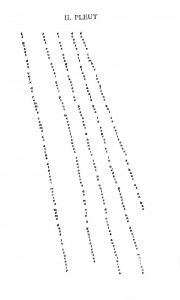December 16, 2013
The poem as object
by Claire Kelley
In the Atlantic, Loyola University New Orleans professor Mark Yakich reflects on the way he and his students have thought about poems in his creative writing classes. What is the definition of a poem? What’s the point of all that white space on the page? Is poetry really just useless? And what happens if we think of the poem as an object?
He offers a challenge: “When we come across a poem—any poem—our first assumption should not be to prejudice it as a thing of beauty, but simply as a thing.” Why? Well it’s historically accurate on one hand—“’Poem’ comes from the Greek poíēma, meaning a ‘thing made,’ and a poet is defined in ancient terms as ‘a maker of things.'”
On the other hand, it offers an opportunity to think about the way in which language operates in playful and emotional ways. Yakich says William Carlos Williams called poems “little machines.” Williams actually said “a poem is a small (or large) machine made of words,” referring to the way the structure and the form of a poem function push language to its limits.
The most productive thing about trying to define a poem through comparison—to an animal, a machine, or whatever else—is not in the comparison itself but in the arguing over it. Whether or not you view a poem as a machine or a wild animal, it can change the machine or wild animal of your mind. A poem helps the mind play with its well-trod patterns of thought, and can even help reroute those patterns by making us see the familiar anew.
And since, as Yakich points out, poetry isn’t a bestselling genre, poetry books become objects endowed with a non-commercial value.
A poem is a text—a product of writing and rewriting—but unlike articles, stories, or novels, it never really becomes a thing made in order to become a commodity…Like no other book, a book of poems presents itself not as a thing for the marketplace, but as a thing for its own sake.
Claire Kelley is the Director of Library and Academic Marketing at Melville House.
